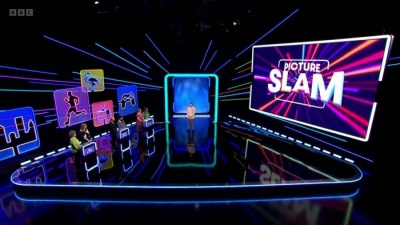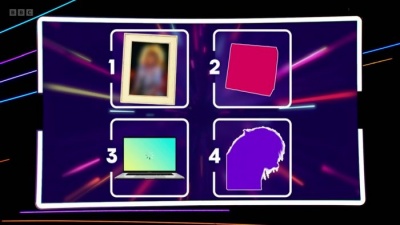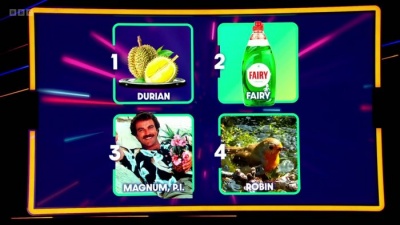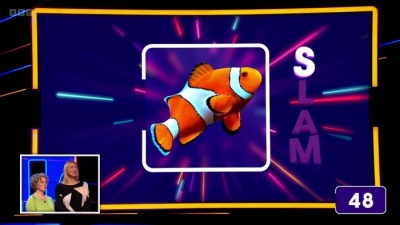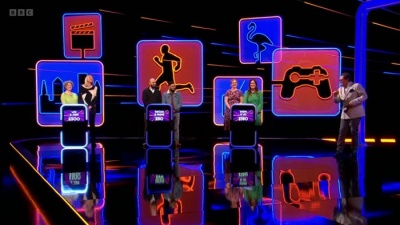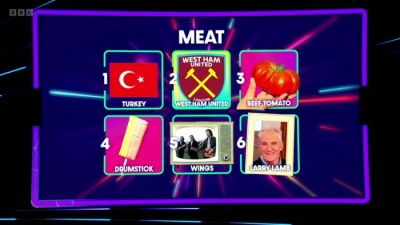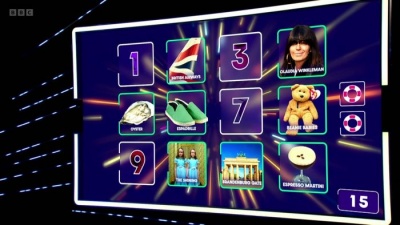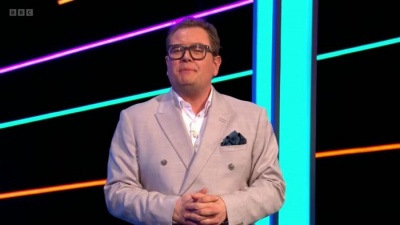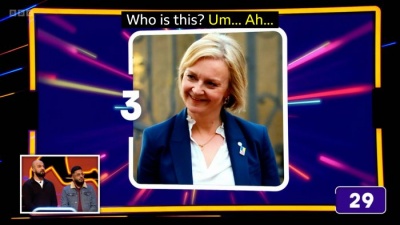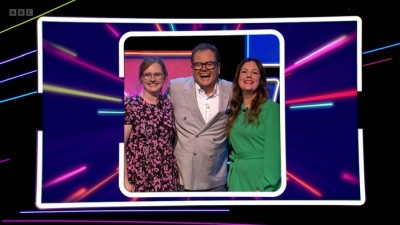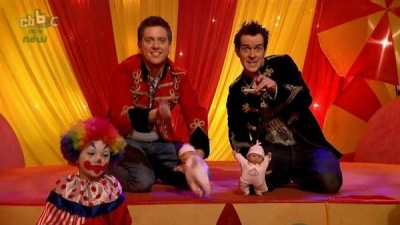Weaver's Week 2023-10-08
Last week | Weaver's Week Index | Next week
It's a television show. It's a pair of spectacles. It's the lightest of light entertainment for Saturday teatime.
Contents |
Alan Carr's Picture Slam
Triple Brew Media (part of Objective Media Group (an arm of All3Media)) for BBC1, from 16 September
There's been a rash of shows lately, all asking us to identify pictures shown on screen. First on air was Joel Dommett's In With a Shout, teams of three try to name lots of things with a loose thematic link, and move up and down a money ladder. Then came The Finish Line, where they spend the first fifteen minutes standing at the start line, naming random objects as they pop up on screen.
And now we have Picture Slam, where they spend all show trying to identify objects. Three teams of two compete, and Alan talks to all of them before there's any action in the game. The show's started, but if you're still busy burning the soup or making a slice of tea, you won't miss much in this early discussion.
You will miss a brief discussion of how the game is played. Pictures of famous things will be concealed from view: the contestants are asked to identify those things. It could be a famous singer, like Tina Turner. It could be a branded product, like Jordan's Coldcuts. It could be a very short clip from a television programme, like Drag Race. Could be a breed of horse, like a Shetland pony. There's money for each item correctly identified, and a bonus amount for getting a "Picture Slam" – all the items on the board.
Round 1 is a board of four items for each team. £50 per right answer, with a bonus £100 for the titular Picture Slam. Wrong answers aren't penalised, players get to shout as many answers as they can, but it's all against the clock – just 30 seconds to name – those things!
Round 2 is a board of five items for each team. Still £50 per right answer, an extra £100 for the Slam, and 35 seconds to name them all.
These items are just – items. Random things. A games console, a person, a game, a film still, some food. No attempt at theming, nothing to link them. Say what you see, there's no edge to this show so far.
We notice that the pictures gently tilt and revolve as they're being displayed. Yes, we know the producers reckon they have to do this because they fear digital burn-in. But this column finds the constant motion to be distracting, and can be a little nauseous. Completely still pictures are allowed to be on screen in other shows for a few seconds.
We're up to round 3, "picture swipe". One minute to name as many things as possible. £50 for each correct answer, and a bonus £100 if you get four in a row. The chain is broken if you have to pass on any picture, and resets to zero if you complete four in a row. They come back to passes after the time expires.
The lowest scoring team after this round leaves the programme, and takes exactly no money home with them.
Two teams remain for round 4. Six pictures on the board, and the values increase markedly – £100 for a correct answer, £200 for a Slam of six. This time, players are going solo, and choose their category from four options prepared by the producers.
Our player has 45 seconds to name all six pictures. Any they don't get will be thrown over to the other side, their player will get one chance to give each of the correct answers. There's no bonus for completing the board.
Inevitably, some of the links are a bit tenuous – a round on "Meat" features the flag of Türkiye, a beef tomato, and notable vegetarian band Wings. Tenuous, and verging on the mildly offensive, if you ask us.
After everyone has played their solo round, it's another game of Picture Swipe. Fifty seconds in total, £100 per thing, £200 per slam. Just one answer per question: get it wrong, or don't answer quickly enough, and control goes to the other team. The leaders start. Whoever's got the least money after this round is out of the contest, and leaves with nothing.
Our show winners have a good wodge of cash – usually somewhere around £3000. To win the money, they need to complete the Super Slam. Twelve things, 90 seconds to name them. Eight correct answers to win the money banked in the main game. Ten correct answers to win £5000. Complete all twelve to take the show jackpot of £10,000. To help, Alan will offer two Lifelines – the initial letter of each word in the answer.
Relentless is one way to describe Picture Slam. Once the quiz begins, it carries on at quite the frantic pace for the entire show. There's barely enough time between rounds to catch breath; most of that downtime is taken up with Alan making cracks and witticisms about the events.
Alan Carr reads out a lot of rules on this show. We don't know how he does it, but Alan Carr has a remarkable ability to make any set of rules sound long and complicated and deathly boring. He is literally draining the programme of excitement, just as he made some of the formats on Epic Gameshow more dull than they probably should have been. Alan has many strengths, but dealing with rules is not one of them: if only the budget on Picture Slam had run to a richardosman to do the dull work.
More awkwardly, Alan has to ask "What brand is this?" "What fruit is this?" when every picture is shown. This takes time, and he appears not to listen to what the contestants say. Talking over the contestants looks rude – and, in a fast-moving show like this, it's inevitable. He could just say "Brand!" "Fruit!", like Roman does on The Finish Line.
Another point of contention is the adjudication. Alan doesn't accept an answer until he's asked "What thing is this?", which could cost a team some money. In one game, when asked "Which pop star is this", they didn't accept "Melanie Chisholm"; they wanted "Mel C" to fit in with the loose theme of "water". C, sea, apparently. Mercifully, this decision did not alter the game in any way.
The grandaddy of all these Name That Thing games is the Name That Thing Interlude from The Satellite Show. Bob Hopeless asked contestants to name things – but only if they began with a particular letter. That two-minute game required more skill and knowledge than the whole of Picture Slam.
Overall, we didn't enjoy Picture Slam. Especially not when compared against In With a Shout. One is the battle of hosts: Joel Dommett is much smoother and gave a lot more encouragement than Alan Carr. There are two voices in most rounds here, while In With a Shout played every round solo until the final.
Another reason is the subjects: on In With a Shout, everything is gently linked together, and we can get to appreciate how the questions are written and feel like we're getting into the programme. Picture Slam just throws objects out at random, it feels like we're back in nursery and having a simple vocabulary test.
Some elements are similar: both programmes had the prospect of everyone going away empty-handed, though it's clear Picture Slam has been designed to make that very difficult indeed.
And both shows are built for Saturday night, light entertainment for the whole family to watch. All the cues are there: upbeat music from Banks and Wag, a neon-tinged set, cash prizes in the "good holiday" bracket. Like Partners in Rhyme, like That Puppet Game Show, Picture Slam can be enjoyed by seven year olds shouting at the telly. It can be enjoyed by seventy year olds encouraging their grandkids to shout at the telly, and perhaps filling in some of junior's blanks. Maybe it's not for this column, somewhere in the middle of that age range.
But the key question: are we going to continue watching. No, we're not, and we watched most episodes of In With a Shout. One show is better than the other, and – in this column's view – it ain't Picture Slam.
In other news
Great outstanding questions of our time Back to 2006, and the final episode of Dick and Dom in Da Bungalow. The big grand prize included that the winner would have their face put into a computer game. All six children won the big grand prize. But which computer game was it? The BBC wouldn't say, because undue product placement was verboten. And we don't think anyone's ever found out. If you know – perhaps if you were one of the final Bungalowheads, or associated with the show – we'd be interested to know.
RTS North West award nominations are out, for the best and brightest telly in the region.
Countdown is up for the Daytime Programme award, opposite Morning Live and Rip Off Britain.
Jon & Lucy's Odd Couples goes for Entertainment Programme, alongside Eurovision Countdown With The One Show and Naked Attraction.
Britain's Best Young Artist gets cheered in Factual Entertainment, Four in a Bed flies the flag for older viewers, alongside Channel 5's The Cruise Welcome Aboard and Know Your Sh!t on Channel 4.
Not game show related, but a very strong lineup for Breakthrough Talent – Abby Cook from Blue Peter, Layla Wright who made documentary "The Champions League Final What Went Wrong", Dylan Bradley from Ralph & Katie, and Alicia Forde from Waterloo Road.
Congratulations to all, recognition from your peers is valuable and deserved. Winners will be declared on Friday 24 November.
Quizzy Monday
Two episodes of Mastermind since we last met. Ben Jones won a low-scoring match, thanks to strong general knowledge and knowledge of F Scott Fitzgerald. Ben wants to beat Jonathan Gibson's mark as the youngest ever winner. Jane Hill won with strong work on Joan Didion, and a superb general knowledge section. Jane got to the second phase in one of Magnus Magnusson's late series in the 1990s.
Success for family teams on Only Connect, as the Gardners beat the Academicals, and the Solomons Family beat the Volunteers. Questions of the fortnight included "what's left after you remove the common names of animals" like chimpanzee and labrador. A sequence on how to solve the river crossing puzzle, and a group of English castles could almost have been Mediterranean resorts changed by one letter. Almost, but not quite.
Parts of the internet went crazy for missing vowels sets entitled "Normal men" "Innocent men" "One girl and her dog". To answer the questions: we've not seen anyone take the blame (or credit) for this, so let's stop asking and enjoy the comedy masterpiece. We do not need to know how they make meat paste!
On University Challenge, Warwick beat Wolfson Cambridge and Edinburgh overcame Bangor. Strong performances from all four teams, though such were the margins that neither loser will return in the repêchage. Wolfson overcame the handicap of hearing "there's plenty of time" after just seven minutes; they were level a little later. Bangor had the misfortune to confuse The Monkees with The Kinks: one was a pop group popular in the 60s and used as filler on MTV in the 80s, the other was The Kinks.
Quiz digest
- Greg Fergus is the new speaker of the Canadian House of Commons. The Liberal represents Hull-Aylmer in Québec. He's the first Black person to become speaker of the Commons; file alongside Betty Boothroyd (Westminster, first Tiller girl), Kevin McCarthy (Washington, first to be deposed), Bronwyn Bishop (Canberra, first to remain a partisan hack).
- Joan Didion, the writer and journalist, had a degree in shopping centre theory.
- The Black Star symbol was inspired by Marcus Garvey, the leader of early Black rights movement "Universal Negro Improvement Association". Although his prescription of Africa solely for Black people has proven unpopular, this particular symbol has been adopted as a point of African unity.
After chasing down the egg-shaped rabbit hole this past month, ITV's finally putting a bit of effort into its autumn schedule. Beat the Chasers (Sun) asks celebrities to know more than famous quizzers, while Big Brother (VM2 and ITV2, from Sun) gets people to live in the middle of nowhere for your entertainment. Outsiders (Dave, Wed) tries to get more celebrities to survive the apocalypse.
More wholesome fare on Channel 4, where Handmade is back (Sun) for another round of charming craftiness. After last week's special, Portrait Artist of the Year kicks off (Artsworld, Wed). Celebrity Antiques Road Trip for lovers of old cars and old things (BBC2, Tue, Wed).
Pictures: Triple Brew Media
To have Weaver's Week emailed to you on publication day, receive our exclusive TV roundup of the game shows in the week ahead, and chat to other ukgameshows.com readers, sign up to our Google Group.


